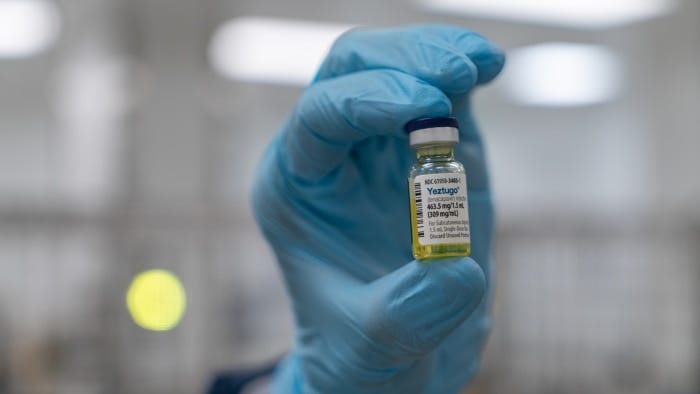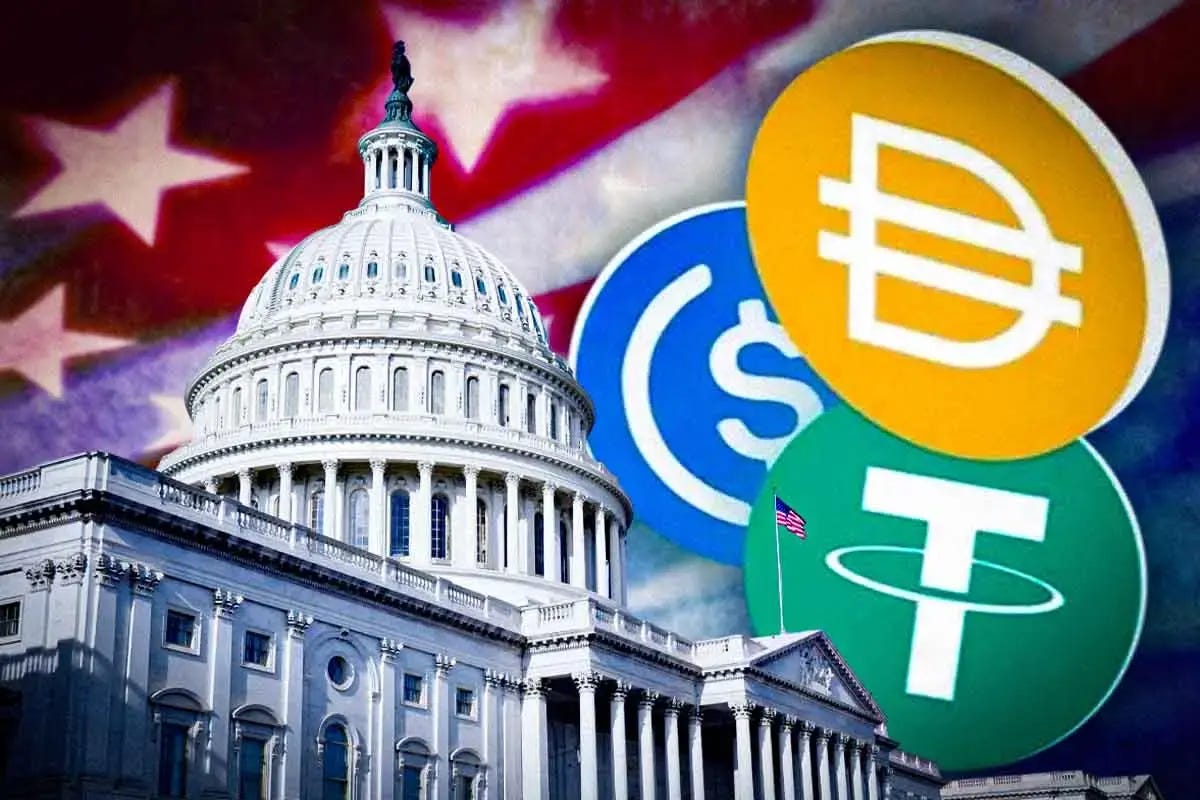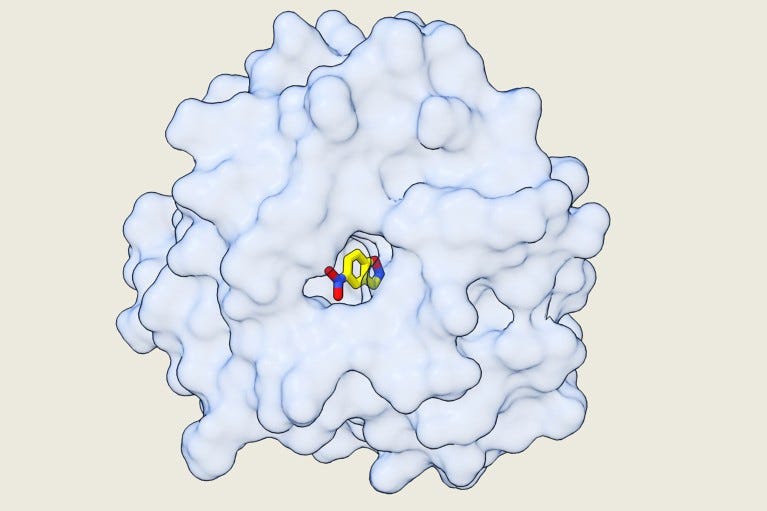Weekly Dose of Optimism #149
Yeztugo, Verve, NYC Waymo, GENIUS Act, Synthetic Enzymes, Sari, Jason x Abundance
Hi friends 👋 ,
Happy Friday, welcome back to our 149th Weekly Dose of Optimism. I am back from what was the best week of my life: I got married to my beautiful wife, Sienna, in Pietrasanta, Italy surrounded by 110 of our closest family and friends. This specific Tuscan region is notable for its combination of both mountains and beaches and seemed pretty undiscovered by the hoards of tourists that generally visit Italy during the early summer. The wedding itself, largely planned by Sienna, was a dream: our moms officiated, Sienna looked gorgeous, I cried, we had two pasta courses, it was so hot but no one seemed to notice, and the wine and dancing flowed well into the night. I even had the Not Boring guy give a Best Man speech (he crushed.) Best night of my life and it’s not even close. It could just be the post-wedding glow, but I am feeling more in love with life and more optimistic than I ever have before.
And the celebrations continue! Today is our dad’s birthday. We wouldn’t be doing what we do if he didn’t give us the love of business, love for each other, opportunity, and tough love that he did. Happy birthday, Pops!
Let’s get to it.
Today’s Weekly Dose is brought to you by… INBOUND
Some companies improve on existing markets. Others create entirely new ones. At INBOUND 2025 in San Francisco, you'll connect with visionaries like Dario Amodei, Victor Riparbelli, and Dharmesh Shah who are pioneering technology-enabled market creation at unprecedented speed.
The agenda is now live! Secure your ticket now to start planning an INBOUND experience that fits your goals and growth plans. Don’t miss this chance to hear from industry icons and connect with decision-makers seeking strategic partnerships and growth opportunities.
INBOUND delivers value you can't get anywhere else — direct access to the founders and thinkers who are redefining industries, practical frameworks you can implement today, and connections that translate to real business opportunities.
Not Boring readers get 10% off their INBOUND General Admission ticket with code NOTBORING10 (Valid thru 7/31).
(1) FDA Approves Powerful Twice-Yearly Treatment to Prevent HIV
Joseph Walker and Peter Loftus for The Wally Street Journal
The Food and Drug Administration on Wednesday approved a powerful new prevention drug for HIV called Yeztugo that promises to keep most people virus-free with two shots a year.
Hope you’re PrEPed for some good news: the FDA just approved a new HIV prevention drug that’s about as close to a sure thing as science gets. Gilead’s Yeztugo, a twice-yearly injectable PrEP drug demonstrated 99.9% effectiveness in trials making it the longest-acting HIV prevention option available. It requires only two shots a year, which solves two of HIV treatment’s longest standing barriers, adherence and accessibility. The treatment is a meaningful advance in a decades-long effort to stop the virus without a vaccine (I don’t blame the community for mistrust here!)
With projected sales of $1.6 billion by 2028, Yeztugo strengthens Gilead’s leadership in the space and puts pressure on rivals like GSK’s Apretude which requires four shots per year. It also signals how far the PrEP strategy (prevention before exposure) has come since Gilead introduced it back in 2012. Pretty amazing how far HIV treatment has come in just our lifetime.
From Lilly
Verve is developing a pipeline of gene editing medicines designed to address the drivers of atherosclerotic cardiovascular disease (ASCVD) through treatments that may only need to be given once in a lifetime. Verve's lead program (VERVE-102) is a potential first-in-class in vivo gene editing medicine targeting PCSK9, a gene linked to cholesterol levels and cardiovascular health.
Lilly is acquiring Verve Therapeutics for up to $1.3B to advance a one-time gene editing treatment that could permanently lower LDL cholesterol by ~50%. Verve’s lead program, VERVE-102, shuts down the PCSK9 gene, potentially replacing daily statins and injectables with a single gene editing dose.
Cardiovascular disease is the world’s top killer and costs the U.S. over $400B annually; about 94M Americans have high cholesterol, and over 30M could benefit from PCSK9-targeted therapies. But long-term adherence is low, and current treatments are expensive. Verve’s single dose treatment is simpler, lasting, and potentially more cost-effective.
The timing is strategic. Just weeks ago, the HHS announced reforms to reduce the cost of manufacturing gene therapies and expand access through Medicare’s new Cell & Gene Therapy Access Model. That clears a major commercial hurdle, and Lilly is wasting no time to take advantage of the scientific and regulatory tailwinds in the massive market of cardiovascular health.
(3) Waymo has set its robotaxi sights on NYC
Kirsten Korosec for TechCrunch
New York, we're coming back to the Big Apple next month! We want to serve New Yorkers in the future, and we’re working towards that goal. - Waymo on X
Waymo may be coming to NYC soon!
The company just applied to test its self-driving Jaguar I-Pace vehicles in Manhattan with a human behind the wheel, as required by New York’s restrictive AV laws. The state mandates a hand on the wheel, $5M insurance, and extensive operator training, making true driverless service currently illegal. Waymo’s lobbying to change that and calling in the big guns like MADD NY and the National Federation of the Blind. When Moms get involved, you better watch out. The whole approach seems very Uber/Tusk early 2010s.
Waymo previously mapped NYC in 2021 but never ran autonomous mode. Now, it's betting that regulators are more open and that its track record matters. It already runs over 250,000 fully autonomous rides per week in Phoenix, San Francisco, Los Angeles, and Austin.
NYC is a different beast: dense, chaotic, and politically complicated. But as Frankie Blue Eyes once noted about New York, “If Waymo can make it here, they can make it anywhere.”
(4) US Senate passes stablecoin bill in milestone for crypto industry
Hannah Lang for Reuters
The U.S. Senate on Tuesday passed a bill to create a regulatory framework for U.S.-dollar-pegged cryptocurrency tokens known as stablecoins, in a watershed moment for the digital asset industry.
The Senate passed the GENIUS Act, the first major U.S. bill regulating stablecoins, crypto tokens pegged to the dollar. It requires stablecoins to be backed 1:1 by liquid assets like cash or T-bills and mandates monthly reserve disclosures. The bill passed 68–30 with bipartisan support but still needs to clear the House before it can land on Trump’s desk, where the very pro-crypto President is likely to sign in.
This bill is particularly notable for a couple of reasons. First, the industry has been asking for clear guidelines and regulation for well over a decade now. Murky rules and laws have, in part, slowed crypto’s institutional and mainstream and option and regulation helps clear up the uncertainty. Second, stablecoins are quickly becoming “the use case” within crypto and certainly having a moment with Circle’s successful IPO and Stripe’s stablecoin/wallet acquisition spree.
Our hope is that this momentum turns into even realer, more mainstream results with large companies and institutions adopting stablecoins to put their businesses on “room-temperature superconductors for financial services.”
There are indications that is happening already. JPMorgan, America’s largest bank, is launching a stablecoin-like deposit token, JPMD, on Coinbase’s Base L2. Not exactly a stablecoin, a deposit token is a digital representation of a commercial bank deposit, but it gives the money stablecoinesque digital powers: it will offer round-the-clock settlement and can pay interest to holders.
Probably nothing.
(5) ‘Remarkable’ new enzymes built by algorithm with physics know-how
Heidi Ledford for Nature
Computer algorithms have designed highly efficient synthetic enzymes from scratch, with minimal need for tedious hands-on experiments to perfect them. The resulting enzymes catalyze a chemical reaction that no known natural protein can execute, achieving a reaction rate and efficiency similar to naturally occurring enzymes.
In a rare L for AI, researchers developed a new way to build synthetic enzymes, tiny proteins that speed up chemical reactions, using a physics-based computer model. These enzymes are 100 times more efficient than ones created with traditional AI, and they can perform chemical reactions that don’t occur naturally. Instead of using trial and error in the lab, the scientists simulated how atoms move and interact, which allowed them to design enzymes from scratch on a computer.
One big breakthrough came when the algorithm challenged a long-standing belief about how enzymes should be built, replacing a complex component with a simpler one that worked even better. The result was an enzyme that looked completely different from any found in nature, with over 140 changes to its structure. This approach could help scientists quickly and cheaply create custom enzymes for making medicines, cleaning up pollution, producing sustainable fuels, and more without waiting years for lab experiments to catch up.
Just a remarkable week for the optimist, indeed.
BONUS: Sari Azout on Hyperlegible
When I first started using AIs, I feared that machines were becoming more human. And yes, it is getting harder to tell the difference. But that's not just because machines are becoming more humanlike, but because humans are becoming more like machines.
Packy here. Earlier this week, I had Sari Azout — a former VC, the founder of Sublime, a friend, and a writer whose work I've long admired; we actually co-wrote the first piece I ever wrote on crypto about a company called Fairmint — on Hyperlegible to discuss her presentation / essay, Becoming unLLMable.
Sari is one of the most thoughtful and tasteful people on the world wide web, something that comes across in her writing, in the product she's building at Sublime, and even her background in this video. While a lot of people are talking about what AI means for humans, Sari is one of the few people I actually want to talk to about that topic.
Because of the format in which she originally presented these ideas, we did this one a little differently. To kick us off, Sari gives the presentation that we gave in Stockholm, and then we dig in on questions I had and things I've been thinking about.
It's characteristically Sari: optimistic but practical, grounded in facts but unafraid to imagine, and informed by her perspective as someone actually using AI to build a product and voice that stands out in a sea of undifferentiated slop. We discuss a bunch of though-provoking ideas, my favorite of which is that average is now attainable by everyone, which means to stand out, you need to be way better than average. She is a case study on how to do that.
DOUBLE BONUS: Jason Carman x Abundance Institute
My friend Jason Carman, the best filmmaker in optimism, teamed up with Abundance Institute, where I’m a Senior Advisor, to make a film on him and his work making films. It’s a full-throated endorsement of something we believe strongly at Not Boring: the future needs a better story.
This is a great peek behind the scenes into Jason’s process, where Story Co is going, and his excellent Too Cheap to Meter energy documentary featuring Not Boring Capital portfolio companies Fuse and Base Power Company and some favorite founders like Casey Handmer of Terraform Industries, Julia DeWahl & Jordan Bramble of Antares, Bret Kugelmass of Last Energy, Isaiah Taylor of Valar Atomics, and Doug Bernauer of Radiant.
The future is bright. Jason is one of the best at telling its story.
Have a great weekend y’all.
Thanks to INBOUND for sponsoring. We’ll be back in your inbox next week.
Thanks for reading,
Packy + Dan








These weekly doses of optimism are definitely appreciated, especially as we walk into the weekend! The momentum in biotech, infrastructure, and policy is a reminder that progress is happening with real-world wins despite the chaos around us.
Good morning, Packy. My name is Salvador Lorca, and together with several collaborators, I lead various free initiatives for the Hispanic community, including the following:
-A daily newsletter that summarizes many articles published on Substack the previous day in Spanish, along with news about Substack.
-A directory of many newsletters in Spanish, classified by topic (there are already almost 2,000).
-A weekly newsletter commenting on fiction published on Substack in Spanish during the previous week.
-A library of the best article of the year from each newsletter, selected by its author.
-3 collaborative magazines (43 authors)
In addition, to provide more quality texts offerings for the growing community of Spanish-speaking readers, for the past year we have translated (with permission and credit to the authors) hundreds of articles from English to Spanish.
To this end, we would like to ask if we can translate part of your articles into Spanish, with links to you and a description of your newsletter.
I believe the benefits could be as follows:
-We would also translate your sponsors' ads, with their links. Given that, in general, 20% of our audience comes from the US, I believe this is an added service for your sponsors and good for their SEO.
-Many of our readers also read in English. They may well prefer to read the original articles and subscribe to your newsletter.
-We always write an extensive Note about each article, with a link to you.
-We would publish a short review of each of the translated articles in the Substack Journal the following day.
-SEO benefits for your newsletter.
-If you wish, you can be a co-author of the translated articles, with a byline. We already do this with Ciler, for example.
We have translated hundreds of authors and none have ever complained. This includes four on a permanent basis, who have never asked us to stop translating their work.
You can read more about our initiatives, with links, here: https://directorio.substack.com/p/our-iniciatives-for-the-substack